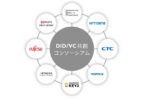On 13 October 2020, IBM Watson Health revealed its latest blockchain certification solution. Digital Health Pass will enable companies to verify employee health status’ while maintaining privacy. In light of the COVID-19 pandemic, it is hoped this will help encourage employees to return to the workplace while allowing employers to calculate their workforce’s potential risk.
How it works
Users of Digital Health Pass can manage their data through an encrypted digital wallet on an app. They’ll maintain full control over the storing, managing, and sharing of their health data. For example, it makes it possible to disclose they don’t have COVID-19 without revealing any other health data, or if they wish they can only share their temperature. Employers on the other hand, will be able to design data-driven policies and responses based on employee health status reviews. The platform, built on IBM’s blockchain, can be incorporated into already existing systems and is designed to be used on a wide scale.
Users will need to download the IBM Digital Health Pass or another third-party app. At login, the app will ask for identity verification. When the relevant data is available, e.g., COVID-19 tests or temperature scan results, QR codes are scanned to add this data to the users’ digital wallet, which creates a credential. The credential is accessible and removable at any time.
IBM envisions Digital Health Pass to be used in public gatherings where health checks are required, e.g., in airplanes, galleries, or at sports events. Credentials will be used as a means of evidence of health. Considering countries across the world are readying themselves for further lockdowns, for now, organizations can use Digital Health Pass to encourage employees to return to the workplace while maintaining safety and privacy.
According to a poll by IBM Watson Health, only 25% of the employees were comfortable with returning to work in June. IBM Watson Health’s General Manager, Paul Roma, believes the Digital Health Pass can help solve this. “Organizations are looking for solutions that can help them manage the return of individuals to public places while striving to protect their privacy.”
Regarding the privacy of the platform, Blockchain VP Eric Piscini said, “We believe that trust and transparency remain paramount when developing a platform like a digital health passport, or any solution that handles sensitive personal information, and we remain committed to this philosophy as we continue to build solutions to help support organizations during the current public health crisis.”
COVID-19 blockchain solutions
Plenty of countries around the world have looked to blockchain for COVID-19 verification purposes. Estonia is taking a similar strategy to IBM, confirming its partnership with WHO for a blockchain COVID-19 vaccination solution earlier this month. The platform will create digital vaccination certificates to serve as proof for those who have had the coronavirus vaccination. The pilot is to be led by enterprise blockchain firm Guardtime.
In Japan, trials of blockchain verification solutions have already begun. In August, Japanese IT firm NTT Data and health care provider LSI Medience Corporation announced the testing of their electronic certificate issuing service for COVID-19 test results. The blockchain-based service ensures companies can receive verified employee test results securely, allowing healthy employees to start returning to work. And GE Aviation has a solution for the aviation sector.






